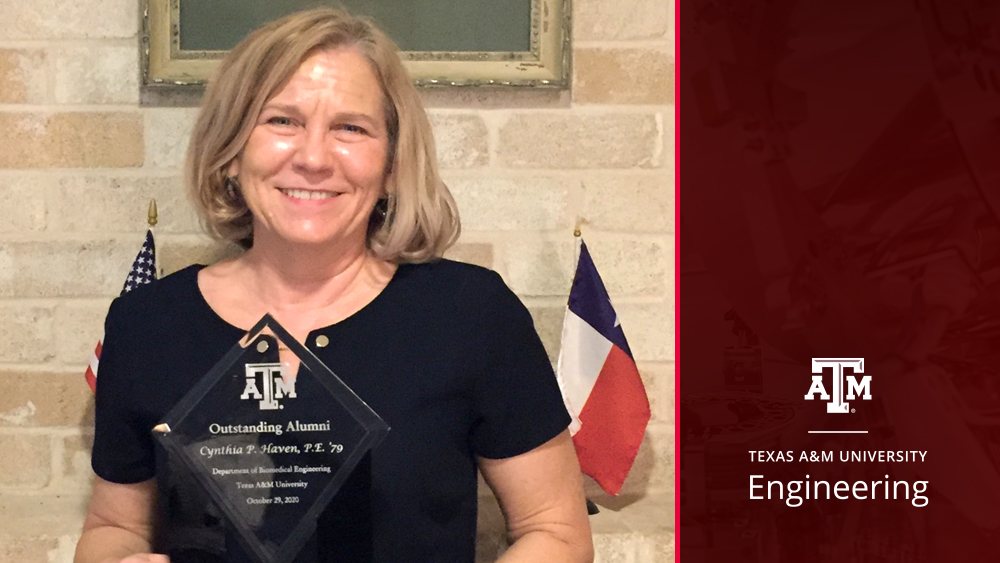
The Department of Biomedical Engineering at Texas A&M University presented its 2020 Outstanding Alumni Award to Cindy Haven ’79, who spent most of her career launching —literally — innovative, biologically based programs at NASA.
“Cindy always took that one more chance to make an impact at NASA, and now we're thrilled to recognize her many accomplishments here today,” said Dr. Mike McShane, department head.
After graduating from Texas A&M with her bachelor’s degree in bioengineering, Haven went to work in the biomedical engineering department at Texas Children’s Hospital. From there, Haven connected with other Aggie bioengineers and took a job at NASA, where she worked for 31 years. She started in the life sciences project division in 1988 and was involved in various roles in Spacelab missions dedicated to life sciences research.
“I did continue to use my biomedical engineering education and relationships,” Haven said. “I wasn’t one of those people who got a degree and changed fields. It served me well my entire career.”
Haven was a key member of the initial team that laid the groundwork for the biomedical and biological research on the International Space Station (ISS), an effort known today as the Human Research Facility (HRF). In 2001, Haven served as HRF increment lead to watch the launch and installation of the first rack of payload equipment that started human research aboard the station, an effort that continues today.
She also managed the ISS Medical Project, worked with the Human Research Program’s International Science Office to establish processes, risk management and data sharing principles across all ISS international partners, and helped NASA transition to the Exploration phase, just as she had when the agency had moved from the Shuttle to ISS initiatives.
Throughout her career, Haven made sure to maintain connections to the department and Texas A&M. She connected with fellow graduates, used social networking to stay in touch and attended events in the College Station and Houston areas. She gives financially and plans to leave a living legacy in the department.
“I do believe in what the department is doing, and that they're doing some amazing things,” Haven said. “I’ve seen some of the amazing students already come past here, and it makes me feel like things are in good hands.”
Over the years, Haven has also mentored students and provided advice, especially to students who may not have received the best career guidance regarding job opportunities and the importance of preparing for the workplace beyond the knowledge gained from the classroom. Haven said she had not known about biomedical engineering until she came to Texas A&M.
“I want to help students with the challenges of getting into the business, understanding what I call lessons learned, what went wrong, what went right,” Haven said.
Some of these lessons learned included:
- Create your own destiny and define your goals.
- Understand why you want to do something before doing it. Establish your success criteria early.
- You don't have to be the best at what you do, but you want to be good at it.
- Decide what return on investment basis is to make sure you focus your energy in the right place.
“A lifetime of learning is something that's very important,” Haven said. “I've tried to make sure that I didn't stagnate. Make sure you get smarter, change your mind along the way, but never, never stop learning, and share with other people what you know.”
The department’s Outstanding Alumni Award is given annually to former biomedical engineering students who shoot for the stars. The award is based on peer nomination.